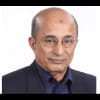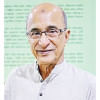Management of electricity now a challenge
With access to electricity doubling to 90 percent of the population in 10 years, the challenge now for Bangladesh is managing peak and off-peak hours, Tawfiq-e-Elahi Chowdhury, energy adviser to the prime minister, said yesterday.
Solutions could be off-peak charging of the over 1 million high occupancy battery-run three-wheelers in rural areas, shifting power consumption periods with incentives and promoting electric vehicles by establishing fast charging stations, he said.
Peaks could also be shaved to fill off-peaks through enhanced regional power connectivity, which will also lower costs, he said and urged all to be responsible in electricity use.
Advocating use of imported liquefied petroleum gas, he said ConocoPhillips had pulled out from deep sea drilling for low oil prices.
Bangladesh cannot wait some 10 years to avail underground resources, rather it has to keep its economy running responsibly and efficiently, he said.
Chowdhury was addressing energy experts after inaugurating the three-day International Conference on Energy and Power Engineering (ICEPE 2019) organised by Brac University's Department of Electrical and Electronic Engineering at BCDM Savar.
He hoped for solving more problems of Bangladesh's power sector with enhanced collaboration with the IEEE Power and Energy Society, the event's technical co-sponsor.
The society has helped the Bangladesh government set up an energy and power research centre and could do more with its database having over 5 million papers and providing 3 million downloads every month, said the society President Prof Saifur Rahman.
Saifur presented a vision for a global power interconnection, showing that engineering cooperation could rise above political differences as regions including Europe, Middle East, North and Southern Africa, the Gulf, Russia and Central Asia were already jointly sharing grids to manage surplus, deficiencies and emergencies.
The conference brought together eminent professors and experts from the USA, UK, China, India, Australia and Bangladesh to exchange ideas on shifting paradigms of energy generation and consumption, smart grids, renewable and green energy and climate change.
Brac University Vice Chancellor Prof Vincent Chang also spoke at the programme and the EEE department Chairperson Professor Shahidul Islam Khan presented the welcome speech.

 For all latest news, follow The Daily Star's Google News channel.
For all latest news, follow The Daily Star's Google News channel. 






Comments